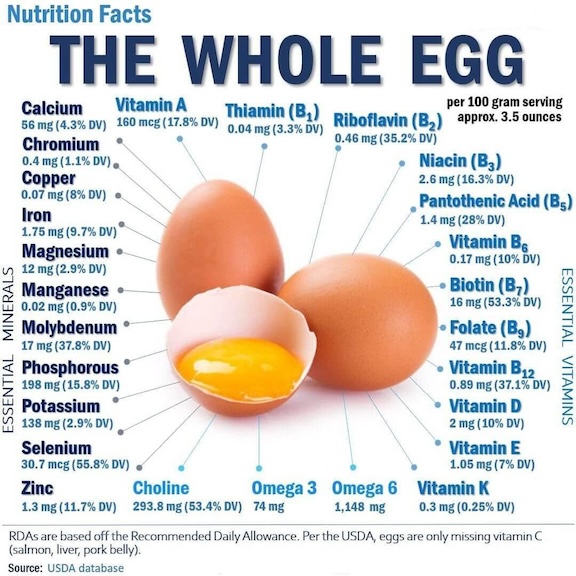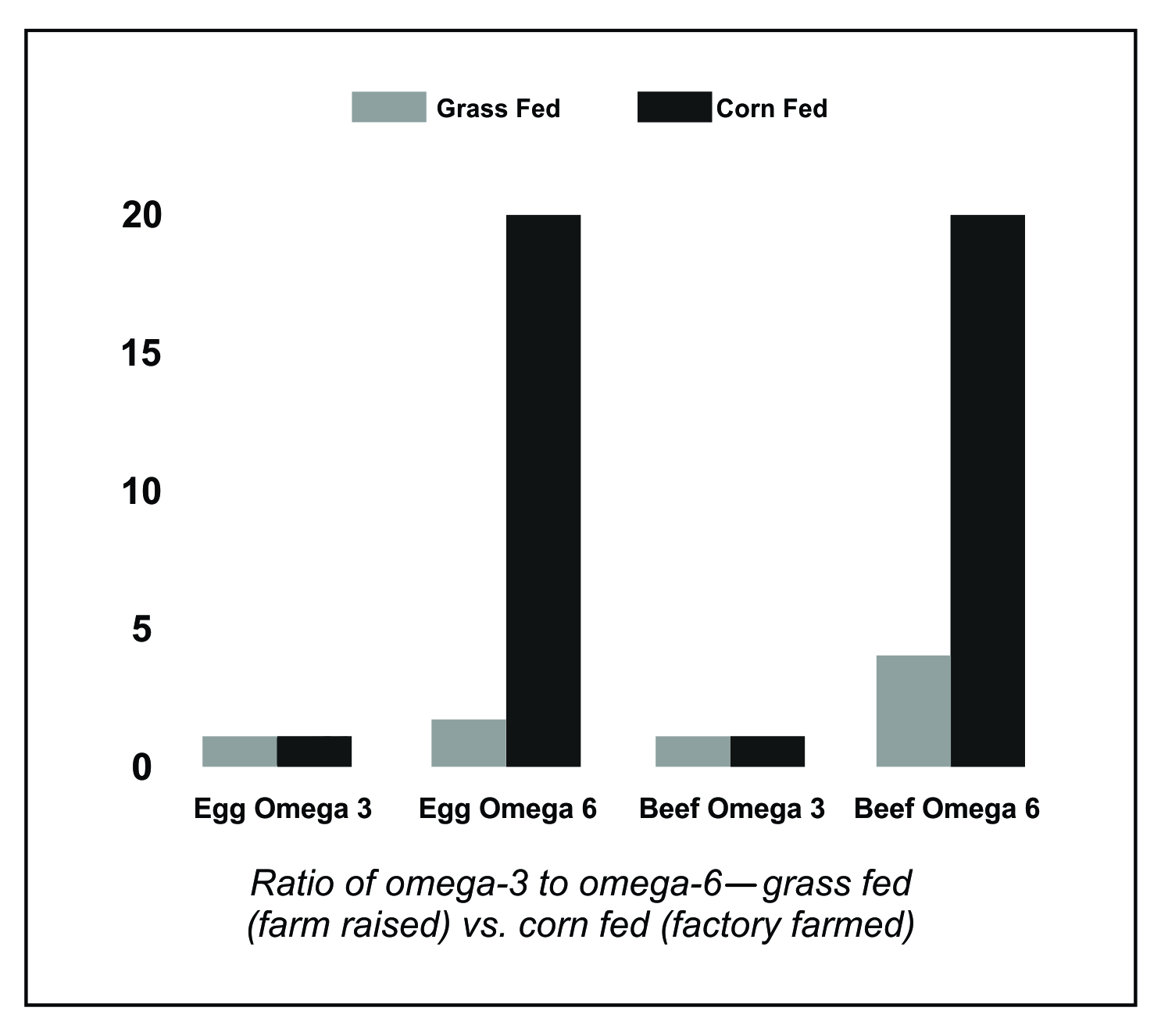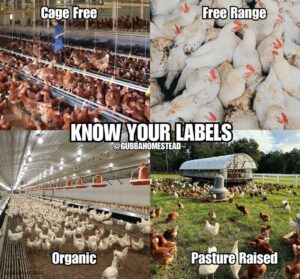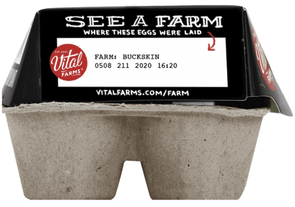NOTE: Previously I published two articles about eggs here, the first entitled A Word About Eggs & Inflammation, the follow-up entitled I’ve Finally Found Healthy Eggs!, and turns out they’ve become two of my more popular articles, so I decided to combine them into one comprehensive article, as well as updating it with new information (twice now), and republish it:
A Natural Superfood
Eggs are one of nature’s true superfoods, with each little self-contained package containing healthy fats, protein, vitamins, and minerals.
To name just a few benefits:
• Eggs contain all 9 essential amino acids (including the amino acids tryptophan and tyrosine, which contain strong antioxidant properties).
• Eggs contain vitamin D and choline (or vitamin B6), of which many people are deficient.
• Eggs have also been shown to increase the absorption of vitamin E from vegetables.
• And regardless of past misguided fears, several studies have shown no correlation between consuming the cholesterol in eggs and coronary heart disease.
And here’s a nutritional graphic I stumbled across online showing the array of nutritional benefits of eggs, courtesy of the USDA (I know, I know, but grain of salt, okay?):

Problem is, all of the above is true of healthy, pasture-raised eggs. But what about the more common factory-farmed eggs?
Omega 3 vs. Omega 6
Eggs contain both Omega-3 and Omega-6 fatty acids. Omega-6 fatty acids are pro-inflammatory, whereas omega-3 fatty acids are anti-inflammatory, therefore counteracting the inflammatory effects of omega-6. So whenever possible, we want to reduce our intake of omega-6, and increase our intake of omega-3.
In his book An Inflammation Nation, Dr. Sunil Pai writes that true pasture-raised chickens eat vegetables, insects, and fresh green grass, which is high in omega-3 fatty acids, whereas factory-farmed chickens are fed mostly corn. As a result, pasture-raised chicken eggs have an omega-3 to omega-6 ratio of 1:1.5, whereas factory-farmed eggs have an omega-3 to omega-6 ratio as high as 1:20!
So every time you eat a factory-farmed egg, you’re getting as much as 14 times the inflammatory omega-6 that you would have gotten by eating a free-range egg!
He also offers the following chart, which depicts the omega-3 to omega-6 ratios of not only farm-raised eggs vs. factory-farmed eggs, but also includes the same for beef. As you can see, farm-raised (pasture-raised) is the way to go, hands down:

Industry Labeling Is Meaningless
But it’s not enough to simply shop for eggs labeled free-range, as the label definitions are vague to meaningless. Like the simple misconception that cage-free is equivalent to free-range, an industry labeling practice used deceptively to imply that the chickens are pasture-raised, but the reality is, they’re nothing of the kind.
In fact, none of the labels used on eggs means much of anything. According to the EatingWell website, here’s what the following egg labels actually mean:
Organic: These eggs are certified to have been laid by cage-free or free-range hens raised on organic feed and with access to the outdoors. However, a recent report by the Cornucopia Institute indicates that many larger producers don’t always comply with these requirements (especially the outdoor access). Most small-scale farmers were found to be in compliance.
Cage-free: Means the hens can roam in a building, room or open area instead of a battery cage, a 16×20-inch cage that houses up to 11 birds. It does not necessarily mean that hens have access to the outdoors. Nor does it indicate how much room they have to move around.
Free-range: Eggs labeled free-range were laid by hens that have access to the outdoors. This can simply mean the hens have an indoor space connected to an outdoor area—not that they are roaming around “free.” In addition to eating grain these hens may forage for wild plants and insects.
And I recently came across this graphic online which helps clarify:

And, even though it’s cattle and not chickens, here’s a video to help illustrate the point, showing cattle being “grass fed”…as you can see, it’s easy to visualize happy cows living contented lives out on natural pastures, eating grass and foraging for other natural food—when the reality is, they’re inside a factory farm having grass dumped on them from a machine, and it even appears that their heads are trapped between steel bars in the process, which is just cruel and abusive (though not unusual, as detailed here). And who’s to say whether these particular cattle are simply grass-fed or grass-finished? There’s a distinct difference there, too—which you can read more about here. So the “grass-fed” label can be just as deceptive as the other mentioned above:
So given these facts, simply being careful as to how your eggs are labeled still doesn’t guarantee that you’re getting healthy, nutritious eggs from healthy, pasture-raised chickens; in fact, most likely they’re not, regardless of how they’re labeled.
On the other hand, one recommended way to ensure the quality of the eggs you buy is to source them from local farmers, and inquire with them as to how their chickens are raised. This is fine, but in my case this would be difficult if not impossible as I live in Las Vegas desert…
So instead, I began rigorously reading labels and researching in an attempt to find truly pasture-raised and healthy eggs.
And I’m now happy to report:
I’ve Finally Found Healthy Eggs!
I located healthy, pasture-raised eggs at Sprouts Farmers Market! (UPDATE: I’ve now located them at Smith’s, Albertsons, and even Walmart! | UPDATE June 2024: Vital Farms just announced that their eggs are now available at Target!)
They’re from Vital Farms and these eggs are truly pasture-raised. On the company website, they describe their mission thusly:
“We are on a mission to bring ethically produced food to the table, and our purpose as a business is to improve the lives of people, animals and the planet through food.”
Also, their product packaging is unique: a black-colored degradable carton, displaying labels such as Ethical Eggs and Happy Hens, along with the most important for our purposes: Pasture-Raised:

They also include a “food traceability” feature which enables customers to input the farm information found on the packaging into the company’s website, which will then show the family farm where the specific carton of eggs was produced:

Another fun little thing they do is include a tiny newspaper-like insert Vital Times in each carton, with news, “bird of the month”, a cartoon, mission statement, and more!:


And I can attest to their quality: upon opening the carton, I immediately saw that these eggs were different…bigger, bolder…and upon cooking them, the yolks were bolder and darker…and the aroma—they smelled like fresh, healthy eggs—and boy do they taste great!
Now granted, they’re a little more pricey—around $6 – $7 a dozen, or around $10 for an 18-pack—but at just over 50¢ each, and as healthy as they are, I think they’re well worth it!
In Summary
As you can see, it really does make a difference how the chickens are raised and fed, as to the quality, healthfulness, and nutritiousness of the eggs…so be sure to look for true pasture-raised eggs…and enjoy!
Like/Follow Lifeology Blog on Facebook • View Rand’s Books on Amazon
Visit Lifeology Store • Like/Follow Lifeology Store on Facebook
A Note To Readers:
If you found this article (or any of the others, for that matter) interesting, informative, entertaining, etc., please consider subscribing to the Lifeology email newsletter: simply enter your email into the form below (also in the right sidebar)—or, if you prefer, just use this simple quick sign-up form.
↓↓↓ Also, please hit the “Like” (thumbs up) button below. Thanks! ~ Rand





















